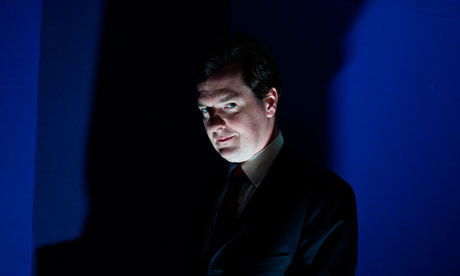Poor families bear brunt of coalition's austerity drive
George Osborne's budget described as 'clearly regressive' by respected fiscal thinktank

In a direct challenge to Treasury claims that the package of spending cuts and tax increases announced in June was fair, the Institute for Fiscal Studies (IFS) said welfare cuts meant working families on the lowest incomes – particularly those with children – were the biggest losers.
The IFS said it had always been sceptical about Osborne's claim that the budget was "progressive" but added that this instant judgment had been reinforced by a study of proposed changes to housing benefit, disability allowances and tax credits due to come in between now and 2015.
Passing judgment that is likely to make uncomfortable reading for the Liberal Democrats, the IFS concluded: "Once all of the benefit cuts are considered, the tax and benefit changes announced in the emergency budget are clearly regressive as, on average, they hit the poorest households more than those in the upper middle of the income distribution in cash, let alone percentage, terms."
Nick Clegg, the Lib Dem leader, has argued that the budget represented "progressive austerity" by sparing the poorest families from the brunt of the attack on the UK's record peacetime deficit.
Alistair Darling, shadow chancellor of the exchequer, said: "Just last week George Osborne told us that his budget was 'fair'. But it's decisions, not warm words, that count. Today there's conclusive evidence that far from being fair the coalition has hit the poorest hardest, especially those with children.
"While Nick Clegg is in charge he would do well to ask himself what he thinks he's doing providing cover for this old-fashioned Tory budget."
An Osborne aide said: "We will take no lectures on fairness from a party that, for example, failed to meet its targets on child poverty and did not restore the pension-earnings link."
The Treasury said last night that it still considered the budget to be progressive despite the IFS assessment. "The government does not accept the IFS analysis," said a spokesman. "It is selective, ignoring the pro-growth and employment effects of budget measures such as helping households move from benefits into work, and reductions in corporation tax.
"It is essential that policy is informed by transparent analysis: that's why we stand full-square behind our budget analysis which is based on what can accurately and completely be measured."
The IFS said the poorest 10% of families would lose over 5% of their income as a result of the budget compared with a loss of less than 1% for non-pensioner households without children in the richest 10% of households. It added that the budget contrasted with the "progressive" plans for 2010-14 inherited from Labour, under which the richest 10% of households bore the brunt of the cuts.
Ed Balls, the shadow children's secretary, said: "So much for the Tory-Lib Dem coalition's promise to be a family-friendly government. It is hard to think of any government in the history of our welfare state that has hit children and poor families so heavily and so fast.
"While Labour's budgets saw hundreds of thousands of children lifted out of poverty, this Tory-Lib Dem budget will see the poorest families with children lose more than any other group. This report is the final nail in the coffin for George Osborne's claims to have delivered anything but the most regressive budget in a generation."
Fiona Weir, spokeswoman for the End Child Poverty campaign, which commissioned the report, said: "The coalition has committed to ending child poverty by 2020, but its cuts are hitting the poorest families hardest. It's not fair that children should have to pay for the cuts and shocking that the poorest families are bearing the brunt.
"The coalition must re-consider its cuts, including changes to housing benefit and uprating benefits. The spending review will need to show clearly how the government will deliver on the commitment to ending child poverty, ensuring that cuts fall on those most able to pay."
The IFS said: "Low-income households of working age lose the most as a proportion of income from the tax and benefit reforms announced in the emergency budget. Those who lose the least are households of working age without children in the upper half of the income distribution. They do not lose out from cuts in welfare spending, and they are the biggest beneficiaries from the increase in the income tax personal allowance."
Osborne's budget is also facing a legal challenge over claims it may break equalities laws.
The Guardian has learned that the government has so far failed to answer whether it carried out an assessment as required by law, showing it had considered whether women, ethnic minorities, the disabled and the elderly would be disproportionately affected by the cuts.
The Fawcett Society has filed a legal challenge and the government was supposed to reply by Monday. It has asked for more time before lawyers acting on its behalf send a reply.
Sources say the equalities impact assessment, as required by the Equalities Act of 2010, has not yet been carried out.
Earlier this month a leaked letter from Theresa May, the home secretary and equalities minister, revealed she had warned Osborne that cuts in the budget could widen inequality in Britain and ran a "real risk" of breaking the law.
May wrote "there are real risks" that people ranging from ethnic minorities to women, to the disabled and the old, would be "disproportionately affected".
Anna Bird, Head of Policy and Campaigns at the Fawcett Society said: "Under equality laws, the government should have assessed whether its budget proposals would increase or reduce inequality between women and men.
"It is our belief that the Treasury did not do this, and so did not follow the law when drawing up their plans. Their continued failure to produce any evidence showing they considered the gender equality impact of the budget only adds weight to this concern."
Source
No comments:
Post a Comment